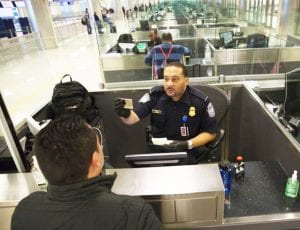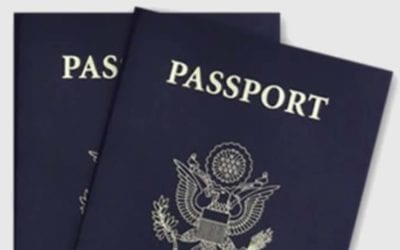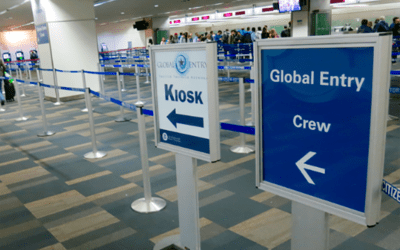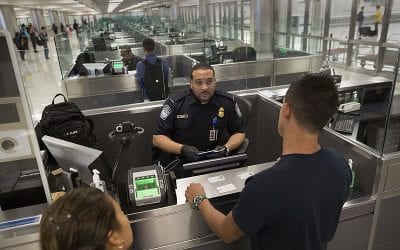Each year too many Americans run afoul of rules when they return through US Customs. Honesty and preparation will go a long way in preventing fines and more severe consequences.

For example, fruit and vegetables brought into the US from abroad by travelers can not only cost a first-time offender $300, but it can also strip the traveler of their Global Entry membership — forever — among the possible consequences.
I call it the “forbidden fruit” case. A woman I know took a middle-of-the-night flight from Cairo to Frankfurt, Germany, to connect with a flight to Philadelphia, several years ago. Her hotel gave her a box breakfast when she left for the airport. She discarded most of the food in Cairo, but kept some to eat on the plane and stuck an apple in her carry-on for the layover.
Bringing in fresh fruit or other agricultural products from foreign nations into the US when returning home can result in fines and the loss of Global Entry privileges for US citizens.

At Philadelphia International, a pesky CBP dog nabbed her. It smelled the apple in her carry-on. When caught by the dog, she exclaimed to the CBP officer, “OMG, I forgot about the apple I got at the Cairo hotel this morning.” She was lucky. The CBP officer realized that the apple was an oversight. While he asked for her passport and took time to fill out some kind of report, he didn’t fine her and let her go on her way to get her checked luggage. She also didn’t lose her Global Entry membership.
That said, each time since then, when she and her husband applied to renew their Global Entry membership, he’s been approved within a week of applying, with no interview required, but she’s had to wait months for approval, then had to schedule an interview. Her interviews have taken about 20 minutes, not the typical five minutes most renewal interviews take. It’s all about that Egyptian apple.
Another air traveler I know wasn’t so lucky. He forgot about the three Jaffa oranges he packed in his carry-on for his flight to New York’s JFK airport from Tel Aviv. A dog nabbed him, too. He was fined $500 and CBP revoked his Global Entry membership. Five years later, he asked CBP if he could get his Global Entry membership reinstated. They told him no. He intends to try again later this year.
CBP must be strict about fruit and other foods brought into the US from abroad to protect US crops from damaging pests and diseases that could destroy US crops for decades.

Photo by Jonas Kakaroto on Unsplash
While you may think that CBP is far too strict about fruit and other foods, you need to understand that they are looking out for the welfare of US farmers and the US food supply chain of fruits, vegetables, and other foods. The problem is that fresh foods brought into the US from foreign nations can introduce severely damaging pests and diseases into the US that could destroy US crops, etc., for decades.
CBP is required to enforce the laws for 40 other governmental agencies at the US border, including the US Fish and Wildlife Service, the US Department of Agriculture, the Food and Drug Administration, and the Centers for Disease Control and Prevention. CBP is required to stop unsafe items from entering the US.
While there are many regulations that CBP enforces that you and I don’t have to worry about, there are more than a few that can affect travelers, to which we all must adhere.
Fresh fruits and vegetables, meats, plants, and seeds are generally not permitted to be brought into the US by citizens and visitors from other nations. While these products are regularly imported into the US, they have a federal import license when an importer brings them in. Appropriate government officials carefully screen them to ensure they are safe.

Photo by Laura Chouette — Unsplash.com
Some straw hats purchased in Mexico and the Caribbean islands may contain pests that could hurt the US food supply and will be confiscated at the border.
Many travelers also don’t know that bringing those colorful straw hats from Mexico and the Caribbean islands can be troublesome. It turns out that CBP is required to inspect handicrafts made from any plant or plant product, such as straw. Many of those hats are confiscated when tourists return through US customs. Fortunately, they’re usually inexpensive.
Most travelers know that there are limits to the amount of alcohol they return with through US customs. What some travelers don’t know is that in addition to US laws, CBP enforces each port of entry’s applicable state laws on alcoholic beverages.
Something that quite a few travelers get caught on are counterfeit items like brand name bags. If you return to the US with multiple Gucci bags, you better have a receipt and declare them, especially if you purchased them as the “genuine article.” You also better hope they aren’t knock-offs violating the Gucci trademark. That would result in confiscation with no reimbursement.
US citizens need to be careful bringing back their prescription medicines, especially if any are controlled drugs.
While US citizens don’t need to declare their prescription medicines when returning home, they need to have the prescriptions in their original containers or have a copy of the prescription or a doctor’s note describing them, mainly if the prescription is for a controlled drug.
If you’ve purchased art from artists of the past, artifacts or art that might be considered a cultural treasure, beware. Cultural treasures and art are considered historic. Most nations generally protect artifacts across the globe. Under the US National Stolen Property Act, which CBP enforces at the border, you can’t legally own stolen art, artifacts, or antiquities even if you legitimately purchased them and have the receipt. At the least, such pieces will be confiscated without reimbursement. When it comes to art and artifacts, it’s buyer beware. If you’re not an expert, find one before purchasing.
 To avoid CBP problems at the border, learn the rules, leave banned items behind when you return to the US, keep your receipts and declare all purchases.
To avoid CBP problems at the border, learn the rules, leave banned items behind when you return to the US, keep your receipts and declare all purchases.
Before you leave on your journey, US citizens should learn the CBP rules they must follow when they return through US customs. CBP carefully spells out most of its essential restrictions and rules on its Prohibited and Restricted Items website page. Before you leave the airport for your return flight to the US, throw out any banned items like fruit and plants, or if you plan to eat them, put them in a separate bag, so you won’t forget them.
When you return home, be sure that you declare every item that you didn’t have with you when you left the US This CBP web page will tell you what you can expect when you return to the U.S. Keep every receipt for each item that you purchased, so you can prove their value to CBP. Don’t make the mistake of hiding anything.
With honesty and preparation, you’ll be able to get through CBP quickly and easily when you return through US customs.
READ ALSO:
Stories chosen the most by readers in 2022
Why “guaranteed late arrival” isn’t actually guaranteed for you
After many years working in corporate America as a chemical engineer, executive and eventually CFO of a multinational manufacturer, Ned founded a tech consulting company and later restarted NSL Photography, his photography business. Before entering the corporate world, Ned worked as a Public Health Engineer for the Philadelphia Department of Public Health. As a well known corporate, travel and wildlife photographer, Ned travels the world writing about travel and photography, as well as running photography workshops, seminars and photowalks. Visit Ned’s Photography Blog and Galleries.




